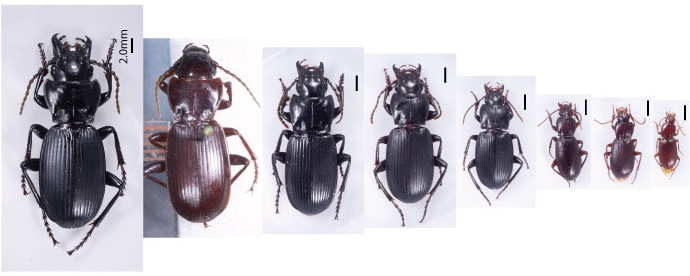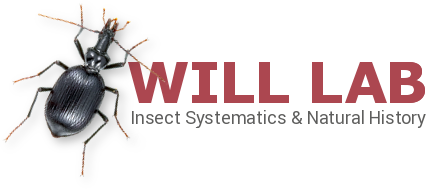Carabid beetles, often called ground beetles, are a clade and family (Carabidae) distributed worldwide that comprises a mix of relatively well-studied groups and faunas, as well as taxa that are very little known and include a large number of undescribed species. Individuals are frequently extremely abundant in many different microhabitats and so carabid beetles are significantly important for ecological studies, have been used as indicator species, are thought to be beneficial as generalist predators, are important for understanding climate change, patterns of biogeography, and much more. They are one of the most commonly used non-model organisms for addressing a wide array of biologically significant questions.
Carabidae is a long-recognized adephagan family with a worldwide distribution and about 35,000 species. More than 12% of all carabids are thought to be pterostichines. Given that pterostichines form a branch on the tree of life more diverse than all mammals, a comprehensive treatment of the included taxa testing phylogenetic relationships and taxon boundaries can reveal important evolutionary questions. Current uncertainty regarding the validity of genera stymies species description and a robust, modern genus-level classification is an important element for overcoming this taxonomic impediment. I have worked on pterostichine ground beetles since the 1990s and they continue to be a focal taxon for me.

My research interests center on the systematics, integrative-taxonomy and natural history of insects. I use a broad range of data types (morphology, DNA, behaviors, etc.) to develop phylogenetic hypotheses. These data contribute to monographic revisions that include the description of new species and development of keys for identification. Understanding all aspects of the study taxon and development of phylogenetic hypotheses for the group worldwide is an essential part of my research, this naturally leads to many avenues of inquiry that address more general questions in biology.
I intend my research to further the cause of systematics, which I believe is to expand our knowledge and understanding of the natural world and provide necessary basic knowledge for other biological studies. In order to develop a broader understanding of insects I emphasize field work and observation of the living animals whenever possible.
